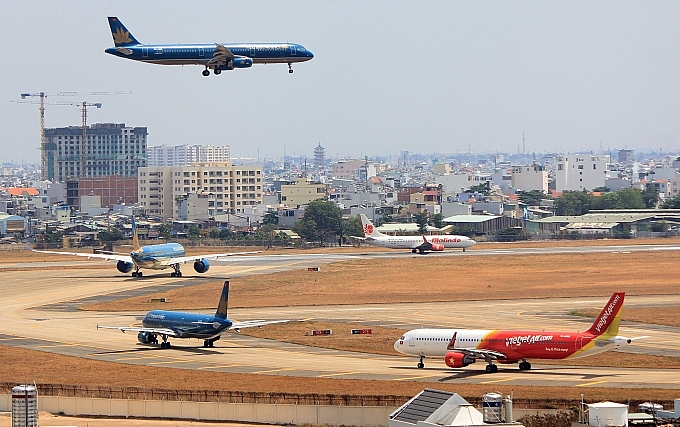Scrutinising foreign ownership limit in Vietnamese airlines
 |
| The MoT has proposed raising the FOL in Vietnamese airlines to 34 per cent in its latest draft decree |
Accordingly, stark differences exist among Vietnam’s three major airlines in respect to what the foreign ownership limit (FOL) should be at Vietnamese airlines to optimise business efficiency.
The three players—national flag carrier Vietnam Airlines and budget carriers Jetstar Pacific JSC and Vietjet JSC—currently hold 98 per cent of the aviation transport market.
In a document commenting on the draft decree amending and supplementing several clauses of the government’s Decree 92/2016/ND-CP and Decree 30/2013/ND-CP on aviation transport business that the Ministry of Transport (MoT) gathered from relevant authorised agencies, Vietjet has proposed raising the FOL from the current 30 to 49 per cent.
Vietjet’s managing director Luu Duc Khanh assumed that the move would not only boost the healthy performance of aviation transport firms through the application of modern management formats by foreign investors, but also attests to the Vietnamese government’s open-door policy through allowing more foreign capital injection into the aviation sector which is capital-intensive and requires governance expertise.
“Several ASEAN economies have raised their FOL in the aviation businesses, with Thailand and Indonesia to 49 per cent and the Philippines to 40 per cent.”
| Stark differences exist among Vietnam’s three major airlines in respect to what the foreign ownership limit (FOL) should be at Vietnamese airlines to optimise business efficiency. |
“If Vietnam insists on keeping the rate below the level applied in regional countries, this could result in an imbalance between market entry conditions and investment environment openness, which will make it more difficult to attract foreign capital flows into the aviation transport sector,” Khanh opined.
In addition, limiting foreign investors' legal ownership in Vietnamese airlines might lead to investors resorting to other transaction methods to raise their stake in these airlines, making it more complex to control foreign investment in local airlines.
Unlike Vietjet, Vietnam Airlines and Jetstar Pacific, which currently have foreign shareholders (Japan’s ANA Holdings at Vietnam Airlines and Australia’s Qantas at Jetstar Pacific), want to retain the FOL at 30 per cent as currently set in Decree No.92/2016/ND-CP.
These airlines argued that once the FOL is loosened to over 35 per cent, foreign investors would have the right to veto important resolutions at the general shareholders’ meetings under the Enterprise Law, making it more difficult to govern the activities of local airlines.
A Vietnam Airline representative assumed that loosening the FOL rate at this point of time might have negative impacts on the domestic aviation market as when investors, especially foreign investors, hold 49 per cent of airlines’ charter capital, they might decide on establishing ‘ghost’ airlines which exist on paper only to sell stakes for profit.
A Jetstar Pacific representative even stated the need to add the requirement that only two years after receiving the aviation transport business license will license owners be allowed to transfer their stake or capital contribution to foreign investors to avoid speculation or selling the entities to foreign investors before a single flight takes off.
In its latest draft Decree sent to the government, the MoT has chosen a compromise by proposing to raise the FOL in Vietnamese airlines from 30 to 34 per cent.
Elaborating on the choice, the MoT said that the new rate would be sufficient to draw foreign investors’ interest while still creating a favourable environment for local firms to develop under the principle of “Vietnamese individuals/entities holding major stakes and effectively controlling business operations.”
What the stars mean:
★ Poor ★ ★ Promising ★★★ Good ★★★★ Very good ★★★★★ Exceptional
Related Contents
Latest News
More News
- Hermes joins Long Thanh cargo terminal development (February 04, 2026 | 15:59)
- SCG enhances production and distribution in Vietnam (February 04, 2026 | 08:00)
- UNIVACCO strengthens Asia expansion with Vietnam facility (February 03, 2026 | 08:00)
- Cai Mep Ha Port project wins approval with $1.95bn investment (February 02, 2026 | 16:17)
- Repositioning Vietnam in Asia’s manufacturing race (February 02, 2026 | 16:00)
- Manufacturing growth remains solid in early 2026 (February 02, 2026 | 15:28)
- Navigating venture capital trends across the continent (February 02, 2026 | 14:00)
- Motivations to achieve high growth (February 02, 2026 | 11:00)
- Capacity and regulations among British areas of expertise in IFCs (February 02, 2026 | 09:09)
- Transition underway in German investment across Vietnam (February 02, 2026 | 08:00)

 Tag:
Tag:

























 Mobile Version
Mobile Version